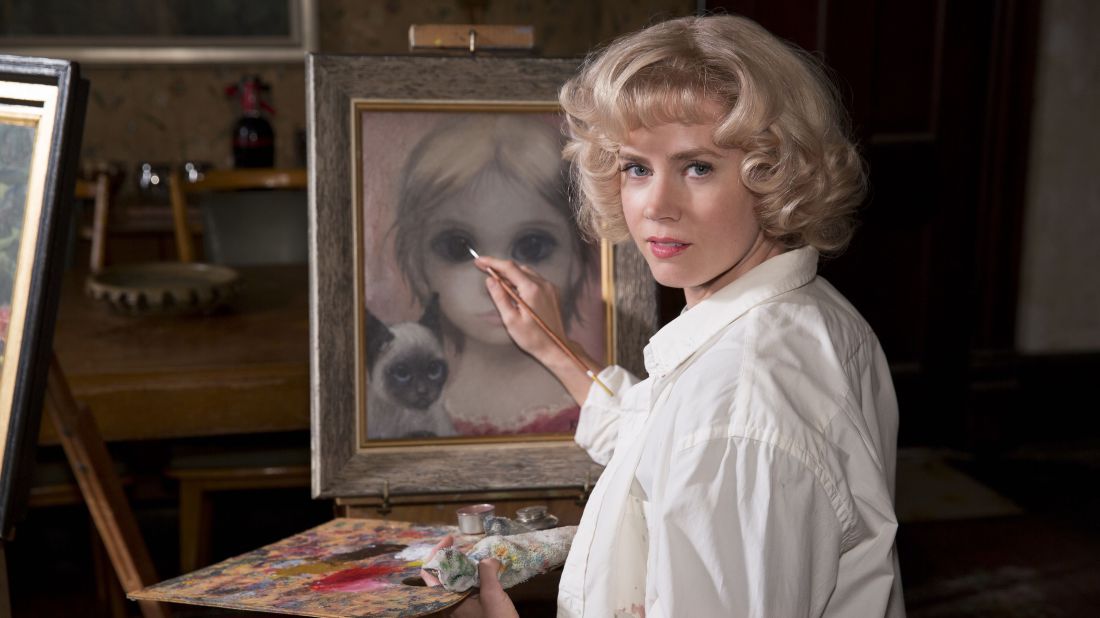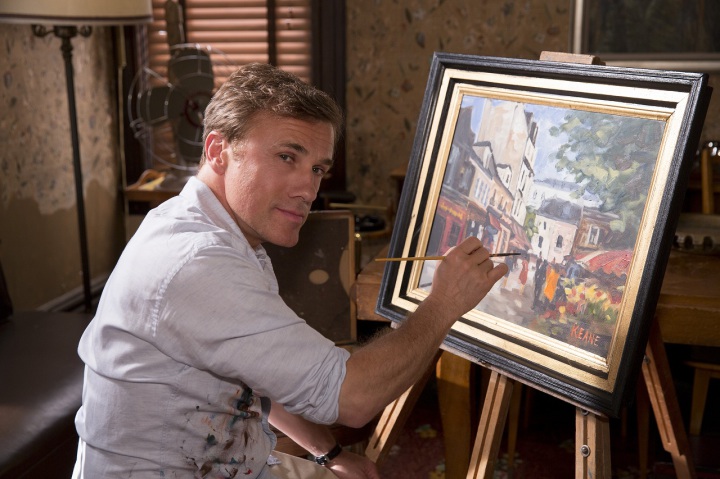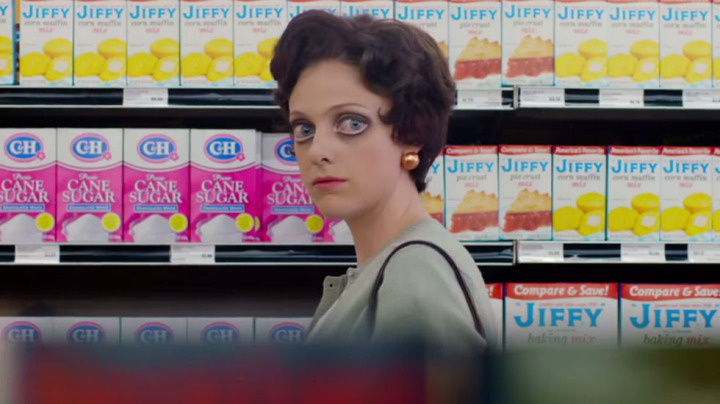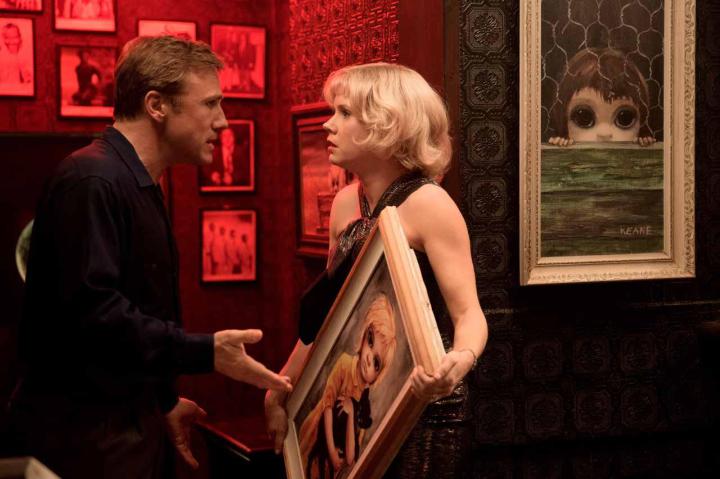When I walked out of the awards screening of Big Eyes, my first thought was that it was a very good movie, but that it wasn’t really a particularly good Tim Burton movie. Well, the further away I got from it, the more I realized that I had been wrong. (That’s the problem with immediate responses and the reason I don’t like to say much about a movie the moment it’s over.) Big Eyes is a very, very good Tim Burton film. Yes, it lacks the Gothic trappings and fantasy we’ve come to expect. And, once we get past its virtually trademarked Burton opening and the Edward Scissorhands suburbia that Margaret Keane (Amy Adams) flees, it doesn’t — at least on the surface — look very much like a Burton film. But looks can be frightful liars, and that’s the case here. Moreover, on a purely thematic basis, Big Eyes is very much a part of the fabric of Tim Burton’s oeuvre. It is also the only really personal movie opening this holiday season.
To put the film in perspective, who but Burton would want to make a movie about the woman who painted those inescapable kitschy paintings of grotesquely big-eyed children that turned up everywhere in the 1960s? I mean, you absolutely couldn’t get away from them. Reproductions — and I suspect more than a few knockoffs — were everywhere. They were even sold in grocery stores. The point of this is brought home forcefully late in the film when the question of who really painted them comes up, and art critic John Canaday (a wonderfully arch Terence Stamp) marvels over the fact that anyone would want the credit for them. It’s exactly the kind of obsession — the ones that make no sense to the outside world — that drives virtually all Tim Burton movies. This one is no different in that regard. Both Margaret Keane and her husband, Walter (Christoph Waltz), are obsessed over things that — financial concerns aside — seem absurd to just about anyone else. But — starting with Pee-Wee Herman’s quest for his missing bicycle in Pee-Wee’s Big Adventure (1985) — Burton responds to this type of (possibly delusional) person.
Big Eyes can be viewed as something of a companion piece to Ed Wood (1994) — and not just because both were written by Scott Alexander and Larry Karaszewski. But I think the story of Margaret Keane strikes a very different — possibly deeper — chord with Burton. Margaret Keane is a product of suburbia, who runs away from that environment — both repressive and protective — to take a stab at being an artist in a big city. What she never seems to realize is that — even in her art — she didn’t so much run away from suburbia as she co-opted it and brought it with her. It’s a background and a basic truth that closely matches Burton’s own — as does the fact that even great success doesn’t necessarily guarantee acceptance or that you’ll be taken seriously. The primary difference is that Burton quite clearly knows he has a complex love-hate relationship with the strange trappings of a suburban background.
Of course, there’s also a strange story of a different kind at work here with Walter Keane taking credit for his wife’s painting — something she goes along with for a variety of reasons, not the least of which is the question of fraud. I’m not going to get into the possibilities this aspect of the story might connect to in real life. That’s tricky speculation at best, and there’s not room for it here. Regardless, Keane — as presented in the film — is a fascinating creation. He’s the man who wanted to be a painter but couldn’t, so he does the next best thing — latch onto someone else’s work and call it his own. It’s how to be an artist without actually being one, and while it’s a monstrous, even soul-killing thing, there remains something sympathetic about the man — at least in Christoph Waltz’s hands. This is a rich, richly entertaining, often very funny movie with fine characterizations, and it definitely deserves your attention. Rated PG-13 for thematic elements and brief strong language.








Looking forward to this return to form for Burton. How do you rate this in his canon? Near the top?
Near the top? Probably not, but it’s way too soon to tell. Understand, however, I don’t buy into the “return to form” idea.
Fair enough, I just really hated Alice in Wonderland and Dark Shows was mess albeit fun sometimes.
I didn’t mind Alice, though I’d only sit through it again if I had to write about. Dark Shadows I thought was splendid, even if the last section faltered.
This finally made it to Oz. I thought it terrific and I could definitely feel the Burton touches throughout, even if I probably wouldn’t have picked it as one of his without the foreknowledge. Another marvellous Amy Adams performance. Probably my favorite Burton film since SWEENEY TODD.
For such a distinctive visual stylist, it’s interesting that Tim Burton’s most frequent collaborator is a composer, not a cinematogapher.
I definitely prefer Dark Shadows and maybe Frankenweenie, though I confess the latter hasn’t really stayed with me.
Most frequent collaborator, yes, but production designer Rick Heinreichs is on nine films going all the way back to the beginning. Then again, Burton has a visual sense, but not perhaps a musical one, though his soundtrack choices for Dark Shadows were pretty inspired, and his handling of Sweeney Todd and the production numbers in Charlie and the Chocolate Factory suggest a musical sensibility. Still, I freely admit that I have been much closer friends — on balance and with notable exceptions — with musicians than film people or writers.
I watched this one a few times and have been enjoying it more and more. On Blu-ray it looks better than ever!
I don’t buy this whole “return to form” crap. I really don’t! I don’t buy it in relation to Burton, to Woody Allen, to Scorsese, or to any other filmmaker. To me, this “return to form” crap is just another bad habit people can’t seem to get rid of.
I think it’s mostly an American disease — the building up of people inevitably followed by tearing them down. The internet has made it worse.
I don’t think Burton ever lost his way (I actually like his Planet of the Apes). I think Scorsese ’95-’02 is his weakest period (really ’91-’02, with the exception of The Age of Innocence) and that Allen’s early ’00s work is hit or miss, but that both have hit a new exciting groove since then.
I’m odd but I prefer Scorsese from Gangs of New York onward to his 20th century fare, though I admit to not being wild about The Aviator.
This whole situation is very sad. Who are the next on the “lost his touch” list? I think Tarantino and Wes Anderson. I have already stumbled across some reviews that said this about them, but they were the exception and not the rule. Tarantino is so afraid of suffering this fate he’s been saying he’ll make two or three other films and then retire!
Journalists and critics here in Brazil are the same, Ken. I don’t think this culture of building up of people followed by their tearing down is exclusively American (unless you meant South America as well).
No, I meant specifically the U.S., but I suspect it has spread. British critics are perhaps the worst, but they’ve always tended toward rather parochial tastes.